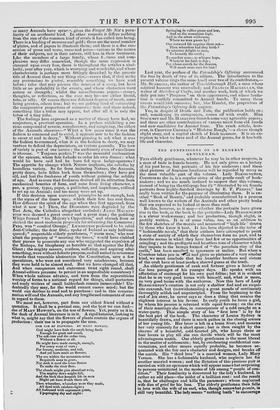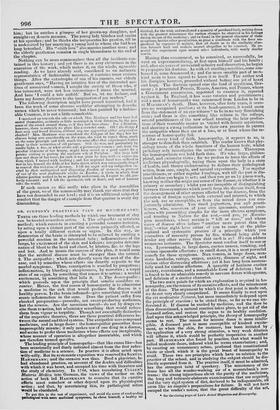THE CONFESSIONS OF AN ELDERLY GENTLEMAN.
Tins elderly gentleman, whatever he may be in other respects, is a man of taste in female beauty. He not only gives us a history of his past loves, but portraits of his fair enslavers ; and these ideal pictures of feminine loveliness will be regarded by many as
the most valuable part of the volume. Lady BLESSINGTON, Countess as she is, is a regular sister of the gentle craft of book- makers ; and we are much inclined to suspect that this volume, instead of being (as the titlepage has it) " illustrated by six female portraits from highly-finished drawings by E. T. PARRIS," has really been written for the purpose of illustrating them. It is an- other "Book of Beauty," and probably manufactured by a process well known to the writers of the Annuals and other pretty books that are expected to be looked at more than read. Be this, however, as it may—whether the portraits have given rise to the book, or the book to the portraits—Lady B LESSI NGTON is a clever workwoman; and her production, though slight, is prettily written. It is of some value, too, as an addition to the few sketches of the morals and manners of "high life" drawn by those who know it best. It has been objected to the tribe of
" fashionable novels," that their authors have attempted to paint a state of society of which they themselves form no part, and to describe scenes in whicl. they have had few or no opportunities of mingling ; and the profligate and heartless tone of character which they impute to the beings formed of " the porcelain clay of the
earth," has been ascribed to ignorance or malice. But when a Countess takes pen in :4t7d and gives us pictures of a very similar kind, we must conclude that her humbler brothers and sisters of the craft have at least made a shrewd guess at the truth. An elderly gentleman of rank and fortune gives a history of the love passages of his younger days. He speaks with an
affectation of contempt for his own past follies; but it is evident that he is on very good terms with himself, and, what is more, on very good terms with the authoress. Now this hero of Lady
BLESSINGTON'S creation is not only a shallow fool and an exqui-
site coxcomb, but (notwithstanding a great parade of sentiment) thoroughly selfish and unprincipled. From the beginning to the end of his story, he never says or does a thing that creates the slightest interest in his favour. In early youth he loves a girl, by whom his passion is returned with equal fervour: on the eve
of their marriage she dies, in consequence of a cold caught on a
water-party. This simple story of his " first love " is by far the best part of the book. The character of Louisa Sydney is beautifully drawn, and there is much pathos in the closing scenes of her young life. Her lover is left in a brain fever, and mourns. her very sincerely for a short space ; but is then caught by the charms of a beautiful, cold-hearted jilt, who keeps three or four lovers in play till she can decide which will be the most advantageous match. Our elderly gentleman is the most liberal in the matter of settlements ; but, by overhearing confidential con• versations, and other means equally probable, he becomes ac- quainted with the fair one's character and designs, and breaks off the match. His " third love" is a married woman, Lady Mary Vernon. She has a fashionable husband, who neglects her for another married woman ; and the flirtation of this precious pair is carried on with an openness which will appear somewhat surprising to persons uninitiated in the modes of life among "people of con- dition." Their familiarity is discovered by the lady's husband, in
rather an odd place—the midst of a brilliant rout: and the result is, that he challenges and kills the paramour; whose neglected wife dies of grief for his loss. The elderly gentleman then falls in love with the wife of an earl, who, though somewhat passOe, is still very beautiful. The lady seems " nothing loath " to eneourago
him; but he catches a glimpse of her grown-up daughter, and straightway deserts mamma. The young lady blushes and smiles at his speeches; and he thinks she reciprocates his passion, till he is undeceived by her marrying a young lord to whom she had been long betrothed. His "sixth love" also marries another man; and the elderly gentleman remains in single blessedness to the end of the chapter.
Nothing can be more commonplace than all the incidents con- tained in this history ; and yet there is an easy cleverness in the execution of the work, which makes it, on the whole, agreeable reading. As we have already said, considered as an authentic representation of fashionable manners, it contains some curious things. After the catastrophe of one of his amours, our elderly gentleman says, " Having an intuitive fear of the interested mo- tives of unmarried women, I sought the society of those who, if less interested, were not less interesting—I mean the married. And here ' I could a tale unfold: But no, let me forbear, and leave my bonnes fortunes to the imagination of my readers."
The billowing description might have passed unnoticed, had it been the work of some obscure scribbler attempting to describe scenes which he never witnessed; but when painted by a fashion- able Countess, it is not a little remarkable.
I sauntered up towards the sofa on which Mrs. Mortimer and her lover had seated themselves, evidently as little restrained in their flirtation, by the pre- sence of the crowd around them, as if they had been alone. For a flirtation, however, there is certainly no place like a crowded rout. Oh ! the things I have seen and heard therein, without any one wearing either surprised or shocked! Mrs. Mortimer was considered the Calypso of her day; but her charms being now considerably on the wane, she tried to repair them, much on the same principle and with much the same effect that experienced dealers adopt in their restoration of old pictures. Still she was, and particularly by candle-light, a fine, or what artists call, a picturesque woman ; and, from the peculiar character of her beauty, might have served as a good model for a painter wishing to portray the unchaste wife of Potiphar. Her large bold eyes met those of her lover, for such it was plain he was, with on ex-pre:shin from which I turned with loathing ; and her ungloved hand was suffered to rest in his, beneath the folds of her India shawl, which was conveniently draped to conceal this violation of decency. 1 felt my anger and my indignation ex- cited by their undisguised and disgusting freedom of manner, in presence of one of the most fashionable circles in London ; a circle in which their relative position seemed to be as perfectly understood, as, I regret to odd, per- fectly tolerated : and I left the apartment, sick at heart, and out of humour with the world.
If such scenes as tlis really take place in the assemblies of the great, we of the commonalty may thank our stars that they have not descended to our level; and it is an additional subject of comfort that the danger of example from that quarter is every day diminishing.



























 Previous page
Previous page